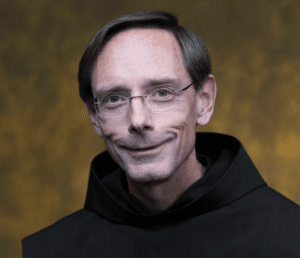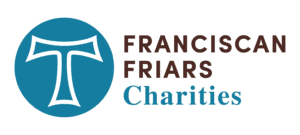
He said he was sleeping in a subway station, and he was hungry. The desperation in his voice was evident when he asked the community if someone would help him find a job and a room to rent. The collective Franciscan response that followed was astounding. Parishioners formed a line to talk to him, the kind of line you’d find at a celebrity book-signing.
“They welcomed him, pressed money into his hand, and provided the references he was seeking. I watched in admiration and wonderment how the congregation, most of them fellow immigrants from Central America, offered to help our new brother,” said Larry Hayes, OFM, who has served at St. Camillus for 12 years (not consecutively) in various positions, including pastor.
“It was humbling to see how naturally and generously these parishioners put their faith into action, despite most living so closely to desperate need themselves. They didn’t think twice about responding to a stranger. Solidarity, community, and compassionate care for those in need are truly constitutive elements of their lifestyle,” continued Larry, adding, “I am touched to the core by their joyfulness, resilience, optimism and deep faith, and their wisdom and generosity, but most of all, their unflinching trust in God’s providence and love.”
He could have easily been speaking about Franciscan life and the example of prayer, fraternity, and compassionate care for the poor and marginalized lived by St. Francis. It was not coincidental that Larry chose to share this particular story of these Franciscan-hearted people of Langley Park on the day that friars across the country are celebrating the feast of their founder, the saint of Assisi.
“What Christmas is to Christians, the feast of St. Francis is to Franciscans. We celebrate the life of the saint who has been called a ‘second Christ’ and ‘the ultimate disciple’ – and over 800 years later, his radical living of the Gospel in imitation of our Lord Jesus Christ is still attractive and compelling in the 21st century,” said Larry. “Francis was transparent and never criticized or judged. I was particularly attracted to his humility and incarnational enthusiasm, showing us how to experience the nearness and presence of God in the Eucharist. He lived the Gospel in an authentic way that responded to the crises of his day – embracing, accepting and defending all of humanity and creation.”
Larry says the spiritual and theological tradition begun by Francis holds tremendous relevance for some of the most pressing problems of our contemporary world: “Francis understood the interdependence of all creatures and humanity, which can help our response to the growing ecological crisis and global climate change. For a world that is terribly bruised and maimed by escalating war and violence, Francis modeled a way of non-violent peace – he visited the sultan of Egypt not armed with a sword, but with a heart open to dialogue and mutual understanding. He showed that solidarity with the poor was the way of Christ.”
THE GOD BUG BITES
Larry was “bitten by the God bug” at a young age, “the influence of the Dominican Sisters in grammar school. In high school, the Jesuits taught me to think for myself and opened me to a more personal relationship with God,” said the Long Island, New York, native. “But it was the friars – with their humanity and joyfulness, openness and acceptance of all, and simplicity and availability to others in vast ministries and works – that drew me to the Franciscans.”
He made his solemn profession in 1988 and was ordained to the priesthood the following year. In addition to his pastoral assignments at St. Camillus Church, he served at parishes in New Jersey (St. Mary’s, Pompton Lakes, and St. Anthony of Padua, Camden), New York (Holy Name of Jesus, Manhattan), North Carolina (Immaculate Conception, Durham), and Delaware (St. Paul, Wilmington). He served on the provincial council and as provincial vicar, and additionally as secretary for formation and studies.
For Larry, parish life has been a place of privilege to walk with people in their ordinary lives, share significant moments of joy and loss, probe faith and experience the presence of God together.
“St. Camillus opened me to a variety of expressions of our Catholic faith by different cultures – African American, White, Hispanic, French-speaking West Africans, Bangladeshi. It has been a joyful, powerful and life-giving experience to celebrate our faith in many languages and traditions – and a privilege to share in baptisms, first communions, quinceañeras, weddings, retreats, anointings, and funerals with wonderful, generous and faith-filled families and individuals,” said Larry.
He characterizes parishes as a place to “green light” new ministries of service to those in need, and to watch those ministries flourish under the guidance and giftedness of talented and dedicated lay leaders who, he says, are a significant part of Franciscan charism, service and evangelization.
NEXT STOP: A NATIONAL PROVINCE
Larry will have the enormous task of helping to shape how the Franciscan friars in the U.S. continue and revitalize existing, and create new, ministries when six friar organizations – part of a unification process – form a single, coast-to-coast province of Our Lady of Guadalupe, which becomes operational later this month. Larry is the Provincial-elect of this new national province.
“I am excited by so many good, talented and motivated friars (700+) from across the United States joining together. I am hopeful that this will be a source of great encouragement for us and for the people we serve – and that it will help us sustain the ministries and works (from soup kitchens to universities, and parishes to outreach) that have characterized Franciscan life in this country,” Larry said.
“We have the responsibility of listening to the voices of not only all the brothers, but also to the voices of the poor and all those we serve. This will enable us to respond creatively to the pressing issues of our day, as Francis did in his – ecology, societal justice, economic inequality – in the light of the Gospel,” he added.
The formation of the new province will be rooted much like Larry’s lived experiences. “What’s most rewarding and joyful is knowing and experiencing that I am not in this alone – that I am a brother among brothers. It’s a blessing and consolation to have a friar community with whom I can share my joys, frustrations, faith, doubts, hurts, growth, failures and successes. It is a gift and source of strength to have brothers who live and share in community and prayer, and value and support each other – and to have Franciscan-hearted people around the country who support our ministries,” said Larry, who has a bachelor’s degree in religion (Columbia College), law degree (Harvard Law School), master’s in scripture and divinity (Washington Theological Union), and master’s in pastoral counseling (Neuman University).
He points to Francis’ own conversion as a guide for the new province, noting that it didn’t happen overnight for him. “He struggled to figure out where God was leading him – don’t we all! It took him time to realize wealth wasn’t happiness, military might wasn’t success, the leper wasn’t repulsive. Gradually he came to understand God’s will for him,” said Larry, who enjoys reading, music (especially piano) and art.
“While I don’t have the courage, or skill, to pick up a paintbrush, I can spend hours in a museum transfixed by the beauty of canvases. Similarly, I can be transported by power of music. Both are modes of transcendence – being taken out of myself and closer to the divine through the experience of beauty.”
Content for this article compiled and written by Steve Mangione.

